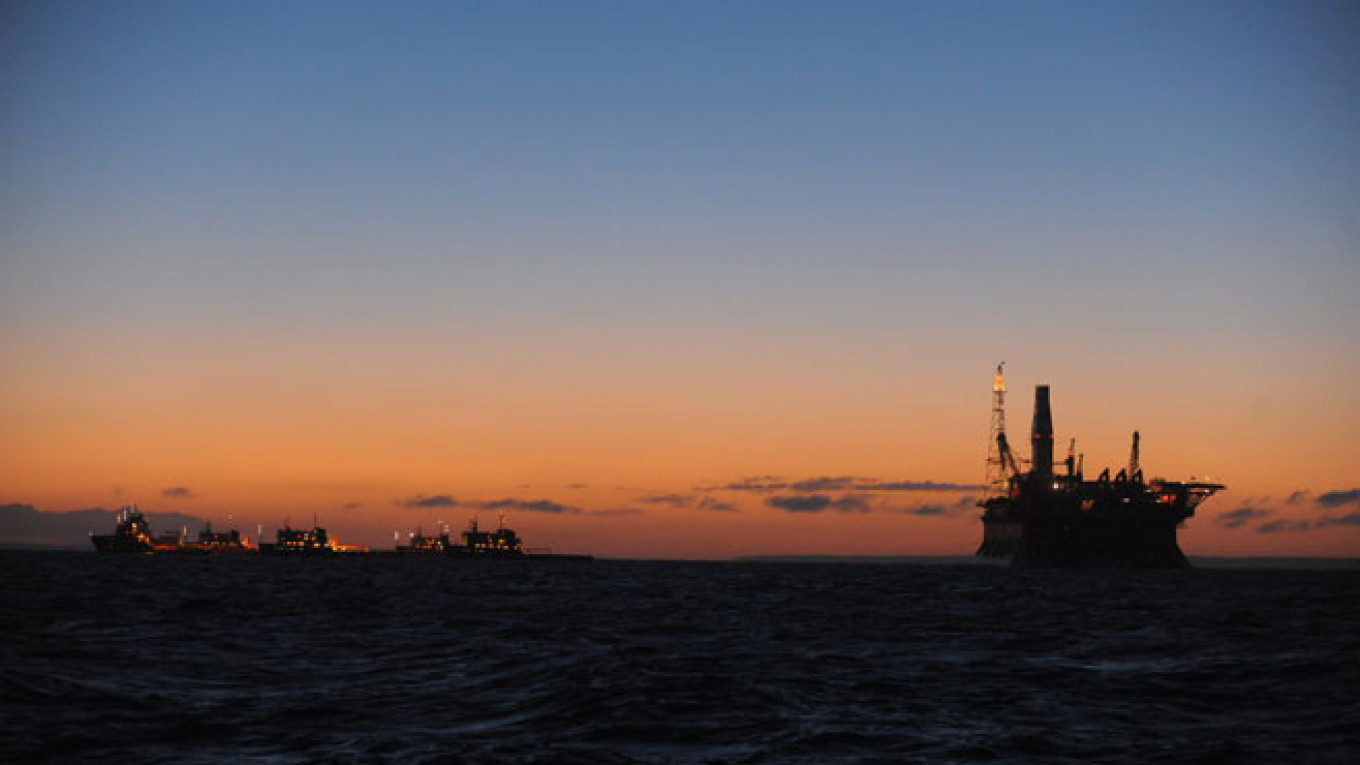Some 100 million tons of annual oil production — or about 20 percent Russia's total oil output — is at risk because of sanctions related to the supply of Western technology and expertise to Russia, Vagit Alekperov, the head of Russia's No. 2 oil company, said Friday.
Executives at an international business forum in Sochi said in the long run, Russian oil companies can do without the Western technology banned by the latest sanctions imposed on Moscow over the conflict in Ukraine.
But at what cost? they asked.
Earlier this month, the United States and European Union imposed sanctions on leading Russian energy companies, including Rosneft and LUKoil, preventing U.S. and EU firms from supporting their exploration or production activities in deep water, Arctic offshore or shale projects.
About a quarter of Russia's oil production currently comes from hard-to-recover reserves with the help of the fracking technology — where powerful, mostly U.S.-made pumps are employed to force oil out of the earth, Alekperov, chief of privately owned LUKoil, said at the International Investment Forum Sochi-2014.
As conventional oil wells begin drying up, the importance of hard-to-reach deposits in Russia — a country that relies for 40 percent of its state budget on oil industry taxes — will only increase.
Most of the automated control systems and communications equipment in the oil industry today come from the U.S. and Japan, Alekperov said, adding that these supplies are now at risk because of Western sanctions.
A firm U.S. ally, Japan has so far imposed limited sanctions on Moscow, and the measures do not touch the oil industry. Tokyo said last week that it was preparing new measures to target the energy sector but has not yet implemented them.
LUKoil is looking to domestic producers and suppliers in Asia to substitute the banned technology, but "not all of it can be fully replaced," Alekperov said.
In the long run, oil producers will be able to make up for the loss of Western technology, but it is not clear how costly this shift will be, he said. Meanwhile, new sanctions could make the situation even worse.
Self-Supported Industry
At the end of the 1980s, just before its collapse, the Soviet Union was pumping 625 million tons of oil per year, 100 million tons more than Russia produces today. And that was done with only Soviet-made equipment.
"Most of the technology now imported from the West, including the fracking technique, was developed in the Soviet Union at the beginning of the 1970s," according to Rustam Tankayev, lead analyst at the Russian Union of Oil & Gas Producers.
After the collapse of the Soviet Union, the facilities that produced drilling and other related equipment for the industry were privatized. In that 'Wild East' era of Russian capitalism, the new owners were too busy squeezing out quick profits to be concerned with developing production, which left the industry in tatters, Tankayev said.
Energy Minister Alexander Novak in Sochi on Friday pledged government support for domestic producers striving to develop substitutes for sanctioned technology and equipment.
But domestic production will not regenerate overnight. And in some areas, such as shelf exploration, there is no alternative to Western technology, Tankayev said: "The deep water shelf exploration ban is a heavy loss because there was no technology developed for this in the Soviet era."
Sanctions could stall the $500 billion of direct capital investment the Russian government thought would be channeled into the development of the Arctic shelf by 2020. Multiplier effects can add another $300 billion in potential losses and cripple prospects for the development of offshore and hard-to-reach oil fields in Russia, according to an earlier report by U.S. investment bank Merrill Lynch.
Outraged Executives
In recent years, Western energy giants like France's Total, British-Dutch conglomerate Royal Dutch Shell and the U.S.'s ExxonMobil came to the rescue of Russia's oil and gas industry, bringing advanced technology, equipment, expertise and investment. For them, the partnership was profitable, granting access to the gigantic oil and gas treasury of the Arctic and the vast reserves in Siberia.
Having poured billions of dollars into these new horizons, Western energy companies are not happy with the bans imposed by their governments, and are in no rush to leave.
Executives of both Total and Shell in Sochi on Friday said they would continue working in Russia despite sanctions, although some of their projects may be affected.
Exxon, which despite early waves of Western sanctions against Moscow began exploratory drilling this summer with state-owned oil giant Rosneft on Russia's Arctic shelf, is now winding down its operations.
These companies may yet outlast the sanctions and free Russia from the need to develop its own technology.
"This is a long-term investment we are making and it will require 10-20 years to bear fruit. It is inappropriate to impose sanctions and then say, invest somewhere else," said Jacques de Boisseson, the head of Total Russia, adding: "I call on politicians: Do not play with the energy industry, it is too fragile."
A Message from The Moscow Times:
Dear readers,
We are facing unprecedented challenges. Russia's Prosecutor General's Office has designated The Moscow Times as an "undesirable" organization, criminalizing our work and putting our staff at risk of prosecution. This follows our earlier unjust labeling as a "foreign agent."
These actions are direct attempts to silence independent journalism in Russia. The authorities claim our work "discredits the decisions of the Russian leadership." We see things differently: we strive to provide accurate, unbiased reporting on Russia.
We, the journalists of The Moscow Times, refuse to be silenced. But to continue our work, we need your help.
Your support, no matter how small, makes a world of difference. If you can, please support us monthly starting from just $2. It's quick to set up, and every contribution makes a significant impact.
By supporting The Moscow Times, you're defending open, independent journalism in the face of repression. Thank you for standing with us.
Remind me later.






